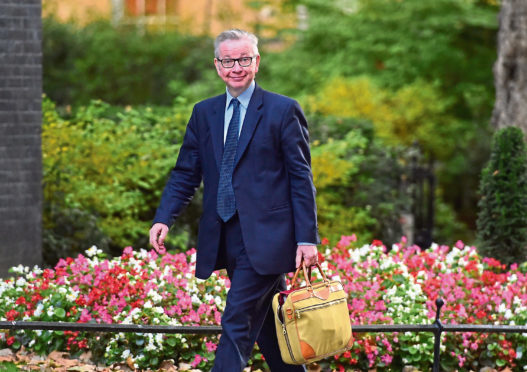Michael Gove has insisted a “slow hand” is better than a “rough wooing” when it comes to introducing post-Brexit plans for agriculture.
The environment secretary was lobbied by Tory former minister Nick Boles to start the “magnificent” reforms in March 2019, rather than waiting until the next decade, by ensuring the UK joins the European Free Trade Association and European Economic Area.
But Leave-backing Mr Gove teased back that he could not agree to such a proposition, and the government’s current plan gave the right balance between urgency and time for reform.
The UK is preparing to leave the Common Agriculture Policy (Cap) and Mr Gove has proposed that in England, the current system be phased out over a seven-year period between 2021 and 2027.
Farmers will instead be paid for “public goods” such as curbing flooding, protecting and boosting wildlife and improving access to the countryside after the UK leaves the Cap, with the Agriculture Bill enabling this change.
Speaking during the Bill’s second reading yesterday, Mr Gove said the terms of reference for a review of funding across the UK will be published shortly, before adding: “One thing I can guarantee is that agriculture funding will not be Barnett-ised and the rightly generous settlement which gives Northern Ireland, Scotland and Wales more than England will be defended.
“More than that, I will want to underline that we provide for all UK farmers a greater guarantee of future funding than farmers anywhere else in the European Union enjoy.
“Our funding is guaranteed until 2022 – in the European Union, the current Cap is guaranteed to 2020.”
Mr Gove said the Bill sets a “clear direction for the future of agriculture” and gave farmers time to make the changes required.
Labour’s shadow environment secretary, Sue Hayman, branded the Bill a “huge missed opportunity” and said the country was in “desperate need” of legislation providing “certainty and clarity” for the food and farming industry.
The SNP’s environment spokeswoman Deidre Brock said the Bill was “not fit for purpose” and needed to be “taken away and thought through again so there is something resembling sensible legislation to be considered”.
She added: “We have a Bill that came prematurely, a lack of focus on the purpose of agriculture, a senseless and damaging power grab, the absence of any indication of a financial underpinning of Scottish agriculture and a protection that Scottish produce currently enjoys being stripped away.”
